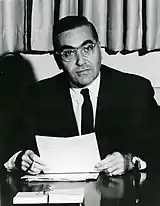Leonard S. Unger
Leonard Seidman Unger (December 17, 1917 – June 3, 2010) was a diplomat and United States Ambassador to Laos (1962–64), Thailand (1967–73), and was the last US ambassador to the Republic of China on Taiwan (1974–79).[1]
Leonard S. Unger | |
|---|---|
 | |
| 10th United States Ambassador to the Republic of China | |
| In office May 25, 1974 – January 19, 1979 | |
| President | Richard M. Nixon Gerald Ford Jimmy Carter |
| Preceded by | Walter P. McConaughy |
| Succeeded by | William Andreas Brown (Chief of mission) |
| 8th United States Ambassador to Thailand | |
| In office October 4, 1967 – November 19, 1973 | |
| President | Lyndon B. Johnson Richard M. Nixon |
| Preceded by | Graham A. Martin |
| Succeeded by | William R. Kintner |
| 6th United States Ambassador to Laos | |
| In office July 25, 1962 – December 1, 1964 | |
| President | John F. Kennedy Lyndon B. Johnson |
| Preceded by | Winthrop G. Brown |
| Succeeded by | William H. Sullivan |
| Personal details | |
| Born | Leonard Seidman Unger December 17, 1917 San Diego, California |
| Died | June 3, 2010 (aged 92) Sebastopol, California |
| Occupation | Diplomat |
Personal life
Unger was born in San Diego, California and graduated from Harvard College with a Bachelor of Arts in 1939.[2] He was the co-author of The Trieste negotiations and co-editor of Laos : beyond the revolution. After retiring from the foreign service, he taught at the Fletcher School of Law and Diplomacy at Tufts University.[3] He died on June 3, 2010 in Sebastopol, California.[4]
Diplomacy career
Unger was a member of the American Academy of Diplomacy and Council on Foreign Relations. He was also the Deputy Assistant Secretary of State for Far Eastern Affairs in the Johnson administration.[5] and the head of the Interdepartmental Vietnam Coordinating Committee, a committee set up by President Johnson to explore various 'use of force' options in the period before United States involvement in the Vietnam war escalated.[6][7] Prior to his involvement in South-East and East Asia, Unger was the United States Political Advisor to the Free Territory of Trieste.[8]
References
- "U. S. Envoy in Taiwan Defends Policy on Peking". The New York Times. June 23, 1974.
- "Dr. Conant Twits Alumni 'Wailers'; A Couple Of Old Classmates Get Together". The New York Times. June 22, 1939.
- "CIA at Tufts University". cia-on-campus.org. 1978-10-30. Archived from the original on 2002-11-13. Retrieved 2011-08-01.
- "State Magazine, December 2010". Scribd.
- "RAIDS WILL GO ON, RUSK REASSERTS; Shift by Reds Could Bring Halt, He Says in Detroit". The New York Times. April 20, 1965.
- "Ex-Envoy to Laos Named To Special Vietnam Panel". The New York Times. January 9, 1965.
- Helsing, Jeffrey W. (2000). Johnson's war/Johnson's great society: the guns and butter trap. Greenwood Publishing Group. p. 24.
- "THE-CONSULATE-OF-THE-UNITED-STATES-OF-AMERICA-IN-TRIESTE". docstoc.com. Retrieved August 1, 2011.
| Diplomatic posts | ||
|---|---|---|
| Preceded by Winthrop G. Brown |
United States Ambassador to Laos 1962–1964 |
Succeeded by William H. Sullivan |
| Preceded by Graham A. Martin |
United States Ambassador to Thailand 1967–1973 |
Succeeded by William R. Kintner |
| Preceded by Walter McConaughy |
United States Ambassador to the Republic of China on Taiwan 1974–1979 |
Succeeded by William Andreas Brown (Chargé d'affaires) |